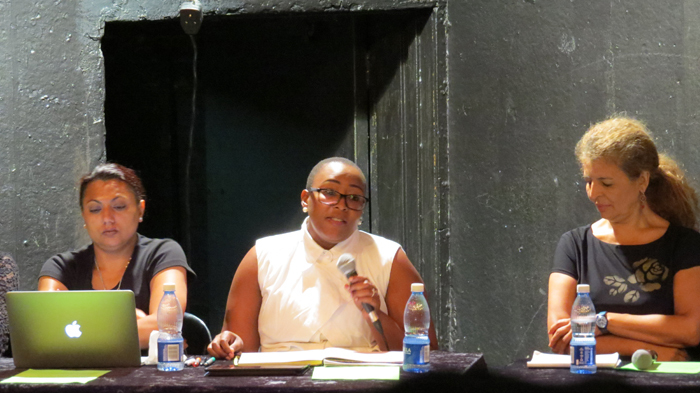Lively debate on transformation in law
04 March 2016 | Story Yusuf Omar. Photo Yusuf Omar.
Originally published 01 February 2016
The legal fraternity and interested public enjoyed a lively debate about the intersections between race, law and transformation on 23 January in the Golden Arrow studio at the Baxter Theatre Centre. Near the end, a passionate exchange between a judge, his fellow panellists and members of the audience threw into sharp relief some of the issues that had been discussed up to that point.
Before that blow-out, UCT's Associate Professor Waheeda Amien described the many entrenched barriers for black academics to break into (never mind progress through) the academy, pointing to inconsistencies in the way appointments were made and the difficulties of getting journal articles published locally. Amien shared an anecdote to illustrate her point.
“When we try to name racist behaviour by colleagues, an immediate defensive reaction occurs,” said Amien. “A few weeks ago, a white member of staff indicated that he or she was so tired of this 'race talk'. And, you know what? I agree. I'm just as tired. Can you imagine being the recipient of racist behaviour, racist decisions, racist conduct, racist speak, since you were born? So why not just get on with the task at hand and fix the problem so we don't have to have these race conversations anymore?”
Associate Professor Ntombizozuko Dyani-Mhango of Wits University concurred, saying she shared many of Amien's experiences.
“I've been told recently by a senior colleague that they never thought that I was going to make it up to the position I hold at Wits. So I said, 'well, I know. That's why I'm still here',” said Dyani-Mhango.
Citing fellow panellist and Wits colleague Joel Modiri, Dyhani-Mhango bemoaned the lack of nuance when teaching South Africa's constitution. The constitution was not the panacea it was often taught to be, and Dyani-Mhango said students all too often lived the “realities of its contradictions”.
For many of her students – all of whom happened to be black – it was a case of being forced to choose between eating and catching a taxi to school. The “rights-based” post-1994 discourse served to entrench the very inequalities it set out to dismantle, she said.
Luthando Vilakazi of UCT's Law Students Council and #FeesMustFall saw contradictions in the way the law was written and its purported intention. Vilakazi was amazed that “we have a right to property that would protect white ownership yet land redistribution is nothing more than a government programme that does not give concrete rights to the people whose land was stolen from them”.
Legal pedagogy exacerbated the problem. Eviction was a mere afterthought in textbooks that dealt with land ownership, for example.
“It's very frustrating, as a law student.”
Professor Pierre De Vos noted a sharp rise in the level of the transformation debate at UCT. A year ago, UCT was debating whether to invoke race in the admissions policy, he said. Some “really strong” voices said that race didn't matter, and that other proxies for disadvantage be used instead.
“I think after the year 2015 and the Rhodes Must Fall and #FeesMustFall movements, that debate almost looks quaint now, a little bit bizarre. I think if have learnt anything from the last year is that race obviously still matters. Everything in South Africa is about race. To claim that it isn't, which of course is something some people will yearn for, it's exactly in expressing that yearning that you affirm how important race is in our society.”
A second panel included Judge Dennis Davis, who came under fire from Vilakazi and other audience members, for 'not recognising his whiteness' and the associated privileges. Davis defended his position, saying he was well aware of the power relations. The key, he responded to Vilakazi, was learning from each other, and “I probably have more to learn from you [than vice versa]”.
The debate was organised by the new dean of UCT's law faculty, Professor Penny Andrews, who pledged that more such discussions would follow.
 This work is licensed under a Creative Commons Attribution-NoDerivatives 4.0 International License.
This work is licensed under a Creative Commons Attribution-NoDerivatives 4.0 International License.
Please view the republishing articles page for more information.










